

 中文摘要:
中文摘要:
利用本实验室分离的防卫基因类似物片段,通过5′和3′RACE,从海岛棉海7124中克隆了一个β-1,3-葡聚糖酶基因全长cDNA,命名为GbGLU。其全长1266bp,含一个编码361个氨基酸残基的开放阅读框。该基因编码产物理论分子量和等电点为MW:39.66kD,pI=9.15,含有糖基水解酶家族17的保守结构域,N端有26个氨基酸残基组成的信号肽。Southem结果显示,GbCLU在棉花基因组中以单拷贝形式存在,研究发现,GbGLU的表达受黄萎病菌的诱导。聚类分析表明,棉花葡聚糖酶基因可分为3类,分别含有糖基水解酶家族3、9、17的保守结构域。无论棉花中的还是本研究中参考的其他作物中,受病菌诱导的葡聚糖酶基因都含有糖基水解酶家族17的保守结构域,故推断其为此类基因参与抗病反应的功能域。
 英文摘要:
英文摘要:
β-1,3-glucanase genes are involved in diverse physiological and developmental processes, including microsporogenesis, pollen germination, fertilization, seed germination, and defense against pathogens. β-1,3-glucanase genes related to plant resistance are the members of a large family of proteins collectively referred to as the pathogenesisrelated (PR) proteins. Several β-1,3-glucanase genes have been cloned from cotton, but the majority of them are involved in fiber development and are independent of resistance. Based on the nucleotide sequence which was isolated previously by our laboratory, we cloned one full length cDNA of β-1,3-glucanase gene (GbGLU) from Hai7124 by RACE method. DNA sequence analyses showed that the size of cDNA cloned was 1 266 bp, and it included an open reading frame of 1 086 bp that eno3ded a polypeptide of 361 amino acids residues with the calculated MW of 39.66 kD and the predicted pl of 9.15. The deduced amino acid sequence of GbGLU contains conserved domain of Glycosyl hydrolases family 17 and has the Nterminal signal peptide composed of 26 animo acids residues. Southern-blot analysis indicated that there is single copy of GbCLU within cotton genome. The expression analysis of GbCLU gene in cotton root infected by Verticillura dahliae strain VD8 showed that its expression was detectable at 48 h and 96 h after inoculation. Glucanase genes cloned from cotton could be divided into three classes according to phylogenetic analysis and possess conserved motif of glycosyl hydrolases family 3, 9, and 17, respectively. In addition, we find that glucanase related with resistance response from cotton and other plants possesses the motif of glycosyl hydrolases family 17. And therefore, we suggest that conserved motif of glycosyl hydrolases family 17 might be the function motif contributing to resistance response.
 同期刊论文项目
同期刊论文项目
 同项目期刊论文
同项目期刊论文
 期刊信息
期刊信息
